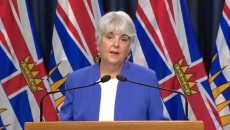The parliamentary budget officer estimates in a new report that it will cost the federal government $17.9 billion to provide eight extra weeks of payments through the Canada Emergency Response Benefit.
The report this morning from budget officer Yves Giroux says that would bring the total cost of the benefit program for people who've lost all or nearly all their work to the COVID-19 pandemic to $71.3 billion.
The CERB, now budgeted at $60 billion, has paid out $43.51 billion to 8.41 million people as of June 4 as demand surges past federal expectations.
With the first cohort of CERB applicants set to hit the 16-week limit on the payments early next month, the Liberals have promised to increase the limit to 24 weeks to provide help through the summer for those who need it.
Giroux's report says the additional cost to the program depends heavily on the outlook for the economy and jobs, as well as the course of the pandemic.
The report says further uncertainty over the final cost of the program rests on the actual takeup of the separate federal wage-subsidy program, which the Liberals plan to retool.
A report this morning from a group of experts convened by the C.D. Howe Institute is urging the Liberals to take the extra time bought by extending the CERB to retool the program itself and put in a program to help recipients retrain for other or better jobs.
Employment Minister Carla Qualtrough and Tiff Macklem, the governor of the Bank of Canada, separately on Monday warned that not everyone will have a job to go back to as restrictions ease and businesses reopen. Some companies may not survive the recession the pandemic has caused, Macklem said.
It's why the C.D. Howe paper also calls for an update to the employment insurance system to handle a possible surge in applicants come September, and for clearer language around a newly imposed requirement on CERB recipients to look or take work when it is "reasonable to do so."
When the Liberals unveiled the wage subsidy and CERB, it was the subsidy program that carried the heftier price tag of over $70 billion. The government styled it the largest social support program in the country's history.
But fewer companies than envisioned have used the subsidy, which now is budgeted to cost $45 billion. As of June 15, the government had approved $13.28 billion in payroll help to 223,918 companies.
Finance Minister Bill Morneau has been working on changes to the program's eligibility rules to improve takeup.
The Liberals' latest estimated cost of the total package of pandemic-related aid was about $153.7 billion, but Giroux's running tally now estimates the cost at $169.2 billion.
Fuelling demand for the CERB has been a steep drop in employment, with three million job losses in March and April as non-essential businesses were ordered closed to slow the spread of the novel coronavirus.
With the possibility of more temporary layoffs becoming permanent, the Liberals on Monday extended the recall period for furloughed workers. In a statement, Labour Minister Filomena Tassi said the decision was due to "a great deal of uncertainty" companies have about when they can bring back employees.






